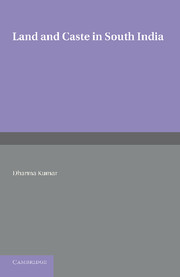 Land and Caste in South India
Land and Caste in South India Book contents
- Frontmatter
- Dedication
- CONTENTS
- List of Tables and Figures
- Acknowledgements and A Note on Certain Connventions
- Abbreviations
- Map of the Madras Presidency
- PART I
- PART II
- VII LAND AND POPULATION
- VIII EMIGRATION
- IX WAGES
- X THE GROWTH OF AGRICULTURAL LABOUR FROM 1871 TO 1901
- XI CONCLUSION
- Glossary
- Bibliography
- Index
VIII - EMIGRATION
from PART II
Published online by Cambridge University Press: 05 June 2016
- Frontmatter
- Dedication
- CONTENTS
- List of Tables and Figures
- Acknowledgements and A Note on Certain Connventions
- Abbreviations
- Map of the Madras Presidency
- PART I
- PART II
- VII LAND AND POPULATION
- VIII EMIGRATION
- IX WAGES
- X THE GROWTH OF AGRICULTURAL LABOUR FROM 1871 TO 1901
- XI CONCLUSION
- Glossary
- Bibliography
- Index
Summary
‘It is doubtful if economic conditions in India have had any effect at all [on emigration]; we may assume, indeed, that the pressure to emigrate, in an economic sense, has always been great enough to provide a stream of emigrants much larger than the actual stream, given opportunity.’ If it were true that, as Dr Kingsley Davis holds, the two factors controlling emigration were economic conditions abroad and legislative enactments in India, then trends in emigration could throw little light on economic conditions in India. Emigration would reflect solely the pull of demand from abroad, after allowing for changes in the law in India. But such a view contains some elements of exaggeration. During the first half of the nineteenth century at least, employment opportunities were not always scarce since land in particular was not in short supply. Also the pressure of home supply of labour varied considerably: there was sometimes a sharp increase in emigration following famines in India, one instance being the spurt in emigration from Madras following the great famine of 1876-8. Thus supply did affect movements in migration, although there can be no doubt that movements in the demand for labour abroad were far more important.
The earliest emigration from South India in the British period was the Tamil exodus to the Straits Settlements which had apparently started before the beginning of the nineteenth century; these emigrants were employed abroad as domestic servants and agricultural labourers. The attempts made by the Government early in the nineteenth century to encourage emigration to Ceylon were at first unsuccessful. In 1815 the Collector of Tanjore, when asked by the Government of Madras to employ all the means in his power to send coolies and cattle to Ceylon, said that the Government of Ceylon would have to send agents and offer special inducements, since the people of his district were ‘averse to any exodus from their native land of cheap living’. Apparently the Government of Ceylon found private enterprise more efficient than official agencies; in 1818 the Assistant Commissioner-General, Ceylon, wrote to the Collector that the Government had entered directly into a contract with maistries (labour contractors) who had agreed to find 600 labourers for them.
- Type
- Chapter
- Information
- Land and Caste in South IndiaAgricultural Labour in the Madras Presidency during the Nineteenth Century, pp. 128 - 143Publisher: Cambridge University PressPrint publication year: 2013


